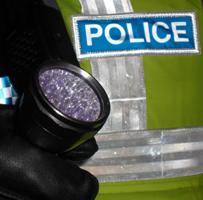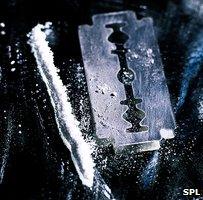Drug torches 'don't always work'
- Published

The 'cocaine torch' was tested on 10 random samples in a drug lab
A drug torch used by police to catch people who snort cocaine doesn't always work, a Newsbeat investigation has found.
The so-called 'cocaine torch' uses ultra-violet rays. Officers claim it lights up bright green if traces of the drug are found on people's faces.
But independent tests at a drugs lab found the torch didn't illuminate 10 random cocaine samples.
Drugs charities are calling for police to stop using the torches.
Newsbeat started the investigation after drugs officers from another police force privately told us they had doubts about its effectiveness at detecting street cocaine.
Newsbeat went to a drugs lab at St Georges University in London and asked a toxicologist to conduct tests on the torch to check if it worked.
The cocaine torch was tested on 10 random samples of street cocaine in a drug lab. It was shone on samples of cocaine on both skin and on paper.
The tests were conducted in both low-level lighting conditions and in a dark room. Not one of the samples illuminated green.
Street cocaine purity
The torch was also tested on six crack pipes. Half of them had no or very little response. The other half Newsbeat tested lit a very pale green.
The company the torches are purchased from, JNE Marketing, only advertise the torches as suitable for testing crack cocaine residue and crack pipes.
It doesn't mention anything about street cocaine which people snort. The company said the cocaine needs to be at least 87% pure to fluoresce under UV light.
The highest level of cocaine purity you can get on the street is around 45%. It's not known why police from certain forces chose to use the torch on people's faces.
John Ramsey is director of TicTac Communications at St Georges University in London, a drugs lab used by the police to identify drugs.
He says the results suggest the torch isn't effective at sampling street cocaine: "It's not going to be an effective way for detecting people on the streets going into clubs for evidence of recently handling cocaine hydrochloride," he said.
"Most of the cocaine used in Britain is hydrochloride. It's snorted rather than smoked as crack.
"And certainly the thing you are likely to find in clubs is cocaine powder. It doesn't appear to detect that.
"If you shined it on peoples faces in a queue in a club, I wouldn't expect it to detect cocaine hydrochloride."
JNE Marketing has sold around 500 torches. Police at forces including Lancashire, Greater Manchester, Cumbria and North Staffordshire have bought them.
At £52.95 each, the company are estimated to have made more than £25,000 in sales.
'Evaluating use'
Newsbeat sent the test results to police. All forces refused to be interviewed but gave statements instead.
Inspector Martin Steventon from North Staffordshire Police said: "We are continuing to evaluate their use, they have been received positively by the night time community and the officers using them."
Police in Cumbria told Newsbeat they put people off using drugs: "Our officers and members of the public have said the torches act as an effective deterrent, and we feel that anything that stops people from taking drugs can only be viewed in a positive light."
Lancashire Police said: "They [officers] are satisfied that they have been used and continue to be used successfully in Lancashire."

The highest level of cocaine purity on the street is around 45%
DCI Trevor Williamson, Coordinator to UK Drugs Nexus Group and ACPO Drugs Committee, told Newsbeat they are aware of the torches: "Clearly there are a number of questions that need to be addressed," he said.
"Due to the interest shown we have established a small working group who will be looking into the issue.
"It is anticipated that they will be in a position to report on their findings about November 2009."
JNE Marketing refused an interview but told Newsbeat they have nothing to do with how the torch is used.
Their website states that the torch is multi-functional: "It has a variety of uses also for identification, security and forensic testing."
'Waste of time'
John Ramsey told Newsbeat there were a whole host of reasons why the torch might light up green when shone under someone's nose.
He said: "There are cosmetics, make-up of various sorts, or perhaps skin-cream products... there almost certainly are things that'll be in the community which will fluoresce."
Claudia Rubin's from the drugs charity Release. She condemned the police using the torches: "They potentially are falsely accusing young people.
"They are infringing their human rights, potentially an invasion of privacy and it's the wrong way to go about tackling drugs."
"It's very, very concerning that police are using a method that is a complete waste of time and a waste of public resources. We should all call upon the police to stop using these kinds of strategies."
DrugScope chief executive Martin Barnes told us he was concerned: "Newsbeat's investigation raises questions about the effectiveness of these cocaine torches and we don't see the evidence to support their use by police.
"This raises serious questions about the worth of investing police resources in these torches."
- Published21 July 2009
- Published15 July 2009
- Published14 July 2009